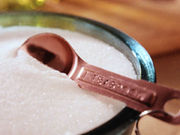Poor scoring on AGREE II criteria across guidelines; evidence supporting recommendations low, very low
TUESDAY, Dec. 20, 2016 (HealthDay News) — Guidelines on dietary sugar intake are of poor quality, and the supporting evidence is of low quality, according to research published online Dec. 20 in the Annals of Internal Medicine.
Jennifer Erickson, R.D., from the University of Minnesota in St. Paul, and colleagues conducted a systematic review of guidelines on sugar intake. Guideline quality was assessed using the Appraisal of Guidelines for Research and Evaluation, 2nd edition (AGREE II).
The researchers identified nine guidelines, which offered 12 recommendations. Each of the guidelines suggested a reduction in the consumption of foods containing non-intrinsic sugars. There was poor scoring on AGREE II criteria across the guidelines, specifically in terms of rigor of development, applicability, and editorial independence. Non-quantitative guidance was provided by seven recommendations, while five recommended less than 25 percent to less than 5 percent of total calories from non-intrinsic sugars. Various health concerns were the basis of the recommendations, including nutrient displacement, dental caries, and weight gain. Evidence supporting recommendations was of a low to very-low quality.
“Guidelines on dietary sugar do not meet criteria for trustworthy recommendations and are based on low-quality evidence,” the authors write. “Public health officials (when promulgating these recommendations) and their public audience (when considering dietary behavior) should be aware of these limitations.”
One author disclosed financial ties to the nutrition industry; a second author disclosed ties to the biopharmaceutical industry.
Full Text (subscription or payment may be required)
Editorial (subscription or payment may be required)
Copyright © 2016 HealthDay. All rights reserved.








